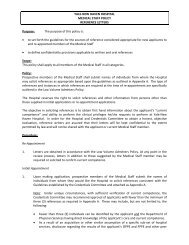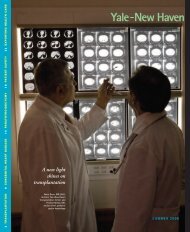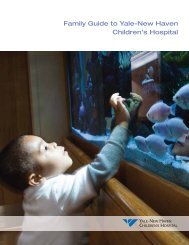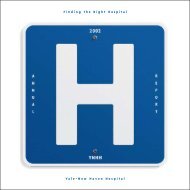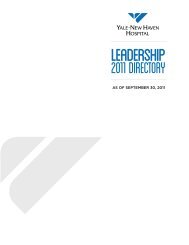Reading materials for conscious sedation - Yale-New Haven Hospital
Reading materials for conscious sedation - Yale-New Haven Hospital
Reading materials for conscious sedation - Yale-New Haven Hospital
Create successful ePaper yourself
Turn your PDF publications into a flip-book with our unique Google optimized e-Paper software.
A. It is the goal of the certification process to ensure that those seeking <strong>sedation</strong> privileges arebeing thoroughly assessed and are able to provide to all patients the same standard of patientcare; whether undergoing a diagnostic, surgical, or therapeutic procedure. All individualsresponsible <strong>for</strong> ordering, administering and monitoring of patients receiving <strong>sedation</strong> will berequired to demonstrate competency prior to their privileges being granted or renewed. Thispolicy applies only when <strong>sedation</strong> and analgesia are provided during diagnostic, surgical, orinterventional/therapeutic procedures. It does not apply to clinicians managing painintervention, alcohol withdrawal, or the control of psychiatric disorders (agitation/anxiety). It isnot a policy directed <strong>for</strong> the <strong>sedation</strong> of patients on ventilators or <strong>for</strong> patients administered onlylocal anesthetics.B. The JCAHO has noted that “because <strong>sedation</strong> – to – anesthesia is a continuum, it is not alwayspossible to predict how an individual patient receiving medication with the intent to achievemoderate to deep <strong>sedation</strong> will respond. There<strong>for</strong>e, qualified individuals are trained inprofessional standards and techniques.” In order to be compliant with the stated standards andtechniques, the credentialling process will incorporate required knowledge of these measures.C. All members and affiliates of the Medical Staff with prescriptive authority under Connecticutstature may apply <strong>for</strong> moderate <strong>sedation</strong> privileges. Individual services may allow Housestafffrom the PGY 3 year and above to be credentialled in moderate <strong>sedation</strong>, after fulfillingmandated requirements, and when administered under the general, but not direct supervision ofan Attending Physician.D. Respiratory compromise is the main potential primary complication of moderate <strong>sedation</strong>, andas such, individuals responsible <strong>for</strong> the administration of moderate <strong>sedation</strong> are responsible <strong>for</strong>monitoring, detecting and treating patients who may experience such compromise. Thoseindividuals completing the certification process and being granted privileges <strong>for</strong> moderate<strong>sedation</strong> and analgesia will be required to:1. Submit recent (within four years) Basic Life Support (BLS) or more advanced life supportcertification, or demonstrate acceptable airway management skills.2. Be able to recognize and safely manage anticipated complications associated with themoderate <strong>sedation</strong> and analgesia process.3. Be capable of establishing a patent airway in order to assure adequate oxygenation andventilation.4. Understand and support the process of identifying any and all untoward events anddocument the occurrence and outcome on the appropriate Adverse Events Form. Adverseand sentinel events are to be reported to the Quality Assurance Subcommittee of the <strong>Yale</strong><strong>New</strong> <strong>Haven</strong> <strong>Hospital</strong> (YNHH), Sedation Analgesia Council and/or directed to the Chief ofStaff within a timely fashion.E. Those individuals seeking moderate <strong>sedation</strong> and analgesia privileges must complete theprocess implemented by the YNHH Sedation Analgesia Council. This consists of verifiedunderstanding of basic knowledge concerning administration of moderate <strong>sedation</strong>/analgesia,as well as demonstrated airway management skills. The process parallels the two-yearrecredentialling cycle mandated by the Medical Staff. Individuals being granted privileges <strong>for</strong>moderate <strong>sedation</strong> and analgesia are required to have knowledge or show competency in theitems described below:1. Assure that sufficient numbers of qualified personnel are present during procedures usingmoderate <strong>sedation</strong> and analgesia in order to:a. Appropriately evaluate the patient prior to beginning the procedure using moderate<strong>sedation</strong> and analgesia.b. Provide safe and effective moderate <strong>sedation</strong> and analgesia.c. Safely per<strong>for</strong>m the intended procedure.d. Appropriately monitor the patient (e.g., level of <strong>conscious</strong>ness, and hemodynamics)e. Ensure a safe recovery and discharge of the patient.2. Administer pharmacological agents to predictably achieve desired levels of <strong>sedation</strong>.3. Understand the pharmacology and appropriate utilization of specific antagonists wheneveropioid analgesics or benzodiazepines are being administered <strong>for</strong> <strong>sedation</strong> and analgesia.Monitor patients carefully in order to maintain them at the desired level of <strong>sedation</strong>.Methods and techniques required to rescue those patients who unavoidably orunintentionally progress into a deeper than desired level of <strong>sedation</strong> or analgesia.Manage a compromised airway and to provide adequate oxygenation and ventilation.


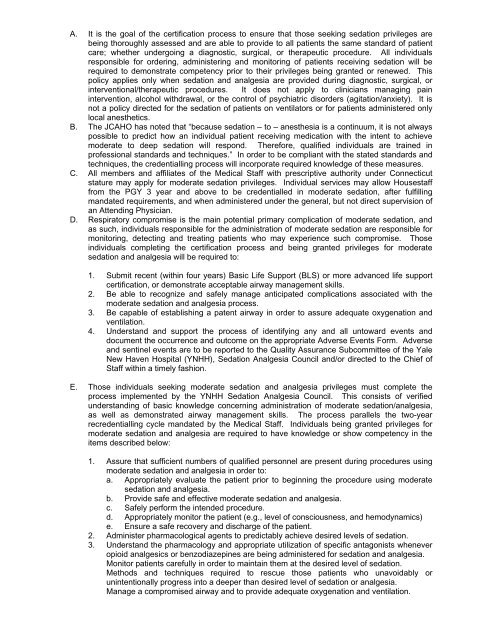
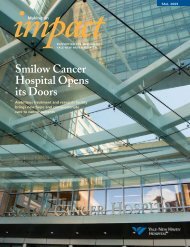

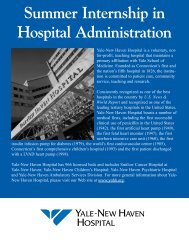
![Annual Report Donor Listings [pdf] - Yale-New Haven Hospital](https://img.yumpu.com/49673575/1/190x245/annual-report-donor-listings-pdf-yale-new-haven-hospital.jpg?quality=85)

